

Gerund or Infinitive? An Interactive Quiz. This interactive JavaScript game helps improve your knowledge of which verbs take the gerund or infinitive (and other variations) when combined with another verb.
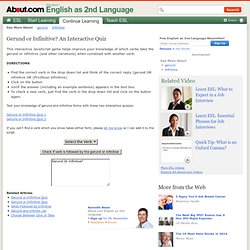
Find the correct verb in the drop down list and think of the correct reply (gerund OR infinitive OR (Pro)Noun Infinitive) Click on the button Voilà the answer (including an example sentence) appears in the text box. To check a new verb, just find the verb in the drop down list and click on the button again. Tag Questions. Irregular Verb Interactive Practice. This interactive irregular verb JavaScript game tests your knowledge of irregular verbs.
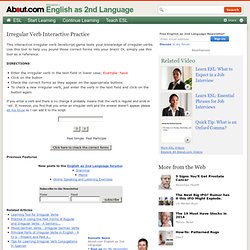
Use this tool to help you pound those correct forms into your brain! Or, simply use this tool as a reference. Enter the irregular verb in the text field in lower case, Example: have Click on the button Check the correct forms as they appear on the appropriate buttons To check a new irregular verb, just enter the verb in the text field and click on the button again If you enter a verb and there is no change it probably means that the verb is regular and ends in '-ed'. Infinitives. Click for Audio 1.
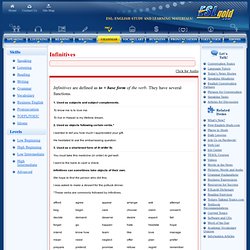
Used as subjects and subject complements. To know me is to love me. To live in Hawaii is my lifetime dream. 2. I wanted to tell you how much I appreciated your gift. Conditional Forms. Conditional forms are used to imagine events in certain conditions.
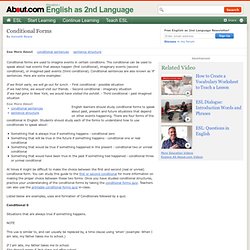
The conditional can be used to speak about real events that always happen (first conditional), imaginary events (second conditional), or imagined past events (third conditional). Conditional sentences are also known as 'if' sentences. Here are some examples: Non Passives. Past Modals. Stative Passives. Modal Verbs for English Learners. Future Perfect Tense. Future Forms for English Learners - English Learners Grammar Focus on Future Forms. The future, like the past and present, has four different forms: Simple Future, Future Continuous, Future Perfect, and Future Perfect Continuous.
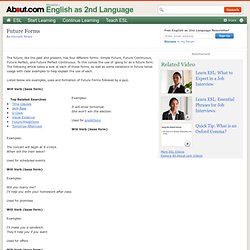
To this comes the use of 'going to' as a future form. The following article takes a look at each of these forms, as well as some variations in future tense usage with clear examples to help explain the use of each. Listed below are examples, uses and formation of Future Forms followed by a quiz. Will Verb (base form) Examples: It will snow tomorrow. Used for predictions The concert will begin at 8 o'clock.
Used for scheduled events Will you marry me? Used for promises I'll make you a sandwich. Used for offers He will telephone as soon as he arrives. Used in combination with time clauses (as soon as, when, before, after) Past Perfect Tense. Future Forms for English Learners - English Learners Grammar Focus on Future Forms. Past Perfect Tense. Present Perfect Progressive. Click for Audio The present perfect progressive expresses the meaning ?
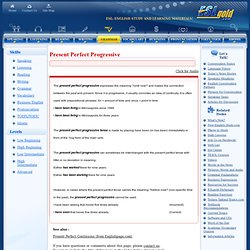
Until now? And makes the connection between the past and present. Since it is progressive, it usually connotes an idea of continuity. Present Perfect. The present perfect is one of the most difficult tenses to learn for intermediate level English learners.
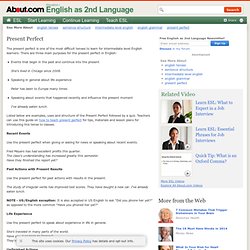
There are three main purposes for the present perfect in English: Events that begin in the past and continue into the present She's lived in Chicago since 2008.Speaking in general about life experience Peter has been to Europe many times.Speaking about events that happened recently and influence the present moment I've already eaten lunch. Listed below are examples, uses and structure of the Present Perfect followed by a quiz. Teachers can use this guide on how to teach present perfect for tips, materials and lesson plans for introducing this tense to classes. Recent Events. Basic English - Past Simple - Essential Lessons for Beginning English Learners. Use the past simple to talk about activities or routines which take place at a specified time in the past.
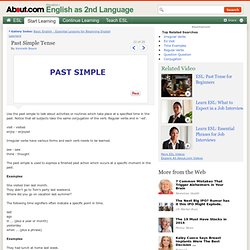
Notice that all subjects take the same conjugation of the verb. Regular verbs end in '-ed'. visit - visited enjoy - enjoyed Irregular verbs have various forms and each verb needs to be learned. see - saw think - thought The past simple is used to express a finished past action which occurs at a specific moment in the past. Examples She visited Iran last month. The following time signifiers often indicate a specific point in time. last ago in ... They had lunch at home last week. Positive Form Subject + past form of verb + object(s) + time They flew to Chicago last month.
Negative Form Subject + did + not + base form of verb + object(s) + (time) They didn't expect to see you at Christmas. Question Form (Wh?) Where did you study French? Test your understanding with this short quiz. Present Continuous. Present Continuous.
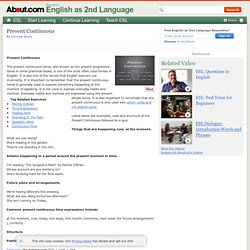
Use of Present Simple Tense. Beginning to intermediate level English learners can use this quick overview of the present simple tense to learn uses and examples of the present tense to speak about routines, facts, and opinions.
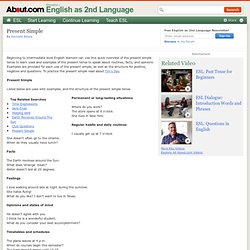
Examples are provided for each use of the present simple, as well as the structure for positive, negative and questions. To practice the present simple read about Tim's Day. Present Simple. Verb Types in English - Guide to Verb Types. Gerunds.